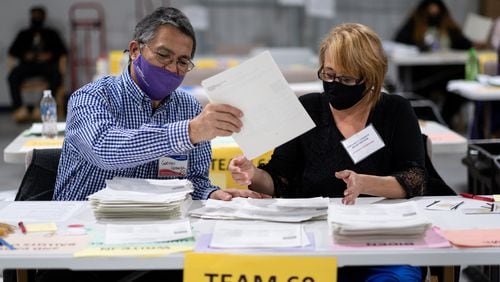It was a rare bipartisan election proposal: Make paper ballots public in Georgia so anyone who doubted election results could see for themselves.
But a bill to make that idea a reality quickly sparked resistance.
Opponents fear the legislation would enable endless “audits” driven by losing candidates who will never accept defeat, turning any ambiguity or mistake into the next stolen election claim.
Democrats withdrew support for the measure following criticism from Fair Fight Action, a voting rights group that Democrat Stacey Abrams started, concerned that the proposal would do more to undermine elections than increase confidence in them.
Georgia election officials conducted three ballot counts and repeated investigations of the 2020 election, finding isolated problems but no widespread fraud. Nonetheless, former President Donald Trump and some of his supporters have continued to spread conspiracy theories about the results.
The bill’s backers say it would allow the public to verify elections, identify errors, detect counting mistakes and hold election officials accountable.
Republican state Rep. Shaw Blackmon, the bill’s lead sponsor, said transparency is the key to building trust in elections.
“This bill would give voters more confidence and help them understand more thoroughly our process,” said Blackmon, who represents Bonaire. “Both parties wanted a paper ballot because people are more comfortable working with real documents. And this makes those documents open to public inspection.”
Under the legislation, original paper ballots generated by voting touchscreens could be inspected by the public, but to avoid tampering, they could only be handled by election workers, who could hold or display them.
Individuals or organizations who request ballot inspections would be responsible for their costs, which could reach tens or hundreds of thousands of dollars to hire additional election staff for a countywide review. An examination of a single precinct or a specific batch of ballots would be less expensive.
Local election officials opposing the measure say ballot inspections would burden election workers and do more harm than good. Under current state law, original ballots can only be unsealed by a court order.
“This latest overreach would circumvent Georgia courts and give bad actors the ability to flood our offices with bad-faith ballot reviews,” seven Democratic county election board members wrote in a letter sent to legislative leaders Friday.
In some states, ballots are treated as public records, such as Colorado, Wisconsin and Florida, where news media relied on access to ballots to inspect the results of the 2000 presidential election between Republican George W. Bush and Democrat Al Gore.
Ballots aren’t public records in states such as Arizona, where the Republican-held state Senate initiated a partisan ballot review in Maricopa County, which ended up finding no proof to support Trump’s claims that the election had been stolen.
Georgia made digital images of ballots public records as part of the state’s voting law passed last year. But the disclosure of absentee ballot images from Fulton County, posted online by The Atlanta Journal-Constitution, didn’t satisfy supporters of Trump who still want to search for counterfeits.
An investigation by the GBI and election investigators was unable to find any counterfeit ballots among batches identified by Republican vote-counters.
The Coalition for Good Governance, an election security organization, is supporting the effort to make original ballots available for public review to check the accuracy of vote counts.
“Voter confidence must be earned, not simply dictated by government officials,” said Marilyn Marks, the group’s executive director. “The last 15 months of spiraling voter confidence has proven that Georgia’s balloting processes are too opaque.”
Democratic state Rep. Shea Roberts, who originally was a co-sponsor of the bill, said she withdrew her support because of concerns it could result in threats toward election workers.
“It’s hard for me as a pro-transparency person, but we’re in different times and we have to take the safety of election workers very seriously,” said Roberts, who represents Atlanta.
Death threats and harassment followed Georgia’s 2020 election, including Secretary of State Brad Raffensperger’s wife and a Fulton worker who was forced into hiding.
Fair Fight Action called the legislation an “anti-voting” bill that would fuel election skepticism rather than promote honest elections.
“These bills would continue to place unnecessary financial and administrative burdens on election workers and local election boards in an attempt to undermine our democratic institutions,” Fair Fight Action Organizing Director Hillary Holley said. “It is time for Georgians to speak up and demand Georgia Republicans stop playing politics with our democracy.”
The legislation, House Bill 933, hasn’t received a hearing yet but could soon be considered in committee.
It’s one of several election measures pending in the General Assembly, including proposals to eliminate absentee ballot drop boxes, require stricter ballot handling procedures and give the GBI more authority to investigate voting fraud.








